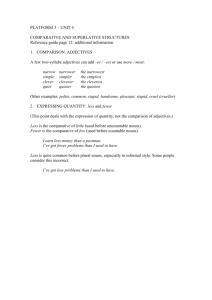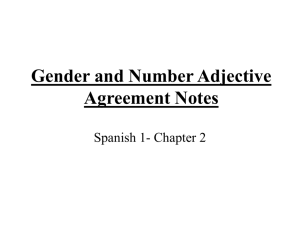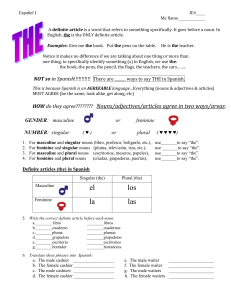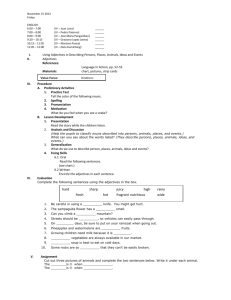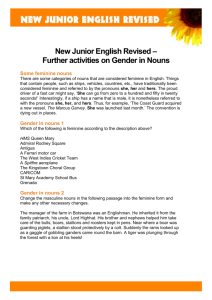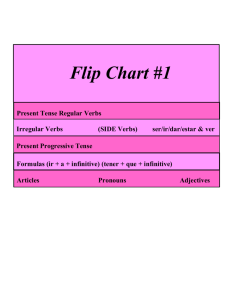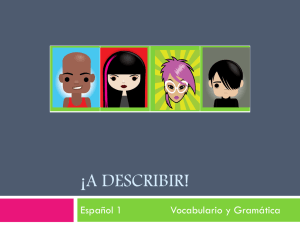Masculine and Feminine Nouns
advertisement
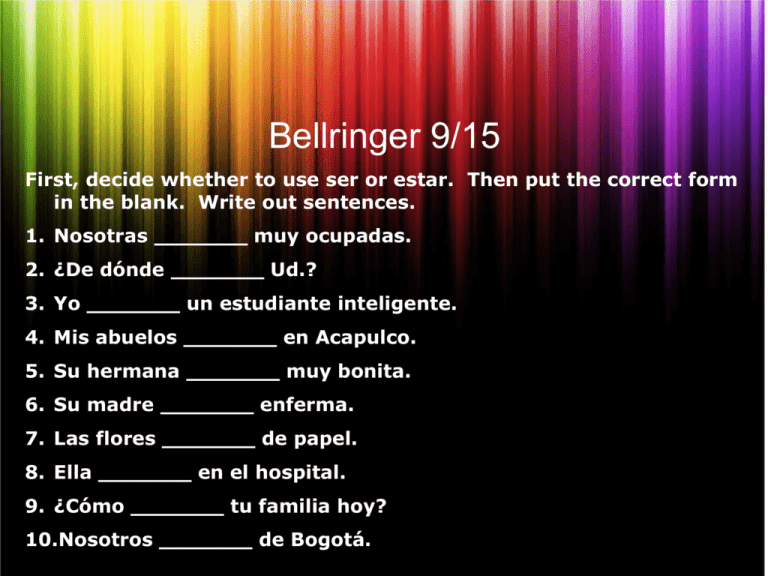
Bellringer 9/15 First, decide whether to use ser or estar. Then put the correct form in the blank. Write out sentences. 1. Nosotras _______ muy ocupadas. 2. ¿De dónde _______ Ud.? 3. Yo _______ un estudiante inteligente. 4. Mis abuelos _______ en Acapulco. 5. Su hermana _______ muy bonita. 6. Su madre _______ enferma. 7. Las flores _______ de papel. 8. Ella _______ en el hospital. 9. ¿Cómo _______ tu familia hoy? 10.Nosotros _______ de Bogotá. Noun/Adjective Agreement -Adjective-word which describes noun or pronoun -In Spanish, all adjectives must agree in number and gender with the nouns they describe -Gender-masculine or feminine -Number-singular or plural Masculine and Feminine Nouns -Masculine nouns usually end with the letters L-O-N-E-R-S. -Feminine nouns usually end in the letters D-ion-Z-A. Making nouns and adjectives plural: -Add “s” to words ending with vowels -Add “es” to words ending with consonants Examples of Masculine and Feminine Nouns Masculine Feminine L-el papel D-la ciudad O-el amigo ion-la televisión N-el jardín Z-la actriz E-el cine A-la amiga R-el borrador S-el martes Are these nouns masculine or feminine? 1.Lección 2.Tinta 3.Universidad 4.Edificio 5.Dedo How to use Adjectives -Unlike in English, in Spanish, adjectives usually follow the nouns they describe. Un chico trabajador Unos chicos trabajadores Una chica trabajadora Unas chicas trabajadoras -To say what someone is not like, put “no” in front of the verb. How would you say…? 1.The short girl 2.A fat dog (perro) 3.The pretty shirt (camisa) 4.Some ugly pants (pantalones) Exceptions: -When a noun or adjective ends in “z,” the “z” changes to a “c” before making it plural -The following are common exceptions to gender rules: -el agua -la mano -el problema (and other words ending in “ma”) For the quiz... -know the Spanish subject pronouns chart, what they mean, and when to use which subject pronoun -know ser and estar conjugations and how they match up with the subject pronouns chart -know the differences between ser and estar -know starred adjectives -know how to make adjectives agree with the noun 10 10 Let’s first see the VERB CHART with the English pronouns: st (1 person) ( 2nd person) (Singular) I (Plural) We You (informal) You all (Spain) ( 2nd person) You (formal) ( 3rd person) He, She, it You all They Spanish Subject Pronouns (Singular) st (1 person) (Plural) yo nosotros(as) (2nd person) tú (informal) vosotros(as) (Spain) (2nd person) usted (formal) ustedes ( 3rd person) él / ella ellos / ellas Ser-to be (yo) soy-I am (nosotros/as) somos-we are (tú) eres-you are (vosotros/as) sois-you all are (Ud.) es-you are (Uds.) son-you all are (él/ella) es-he/she/it is (ellos/ellas) son-they are Estar-to be (yo) estoy-I am (nosotros/as) estamos-we are (tú) estás-you are (vosotros/as) estáis-you all are (Ud.) está-you are (él/ella) está-he/she/it is (Uds.) están-you all are (ellos/ellas) están-they are Note the accent marks on the bottom 4 lines!!! activo/a* atlético/a* trabajador/a* perezoso/a* simpático/a*, amable antipático/a* bueno/a* malo/a* alto/a* bajo/a* moreno/a* rubio/a* pelirrojo/a* extrovertido/a*, conversador/a, hablador/a tímido/a* inteligente* tonto/a* cómico/a*, gracioso/a* bonito/a*, hermoso/a guapo/a* flaco/a, delgado/a* gordo/a* Estar Vocabulary contento/a*, feliz, alegre triste* cansado/a* enfermo/a* enojado/a* nervioso/a* ocupado/a* loco/a

